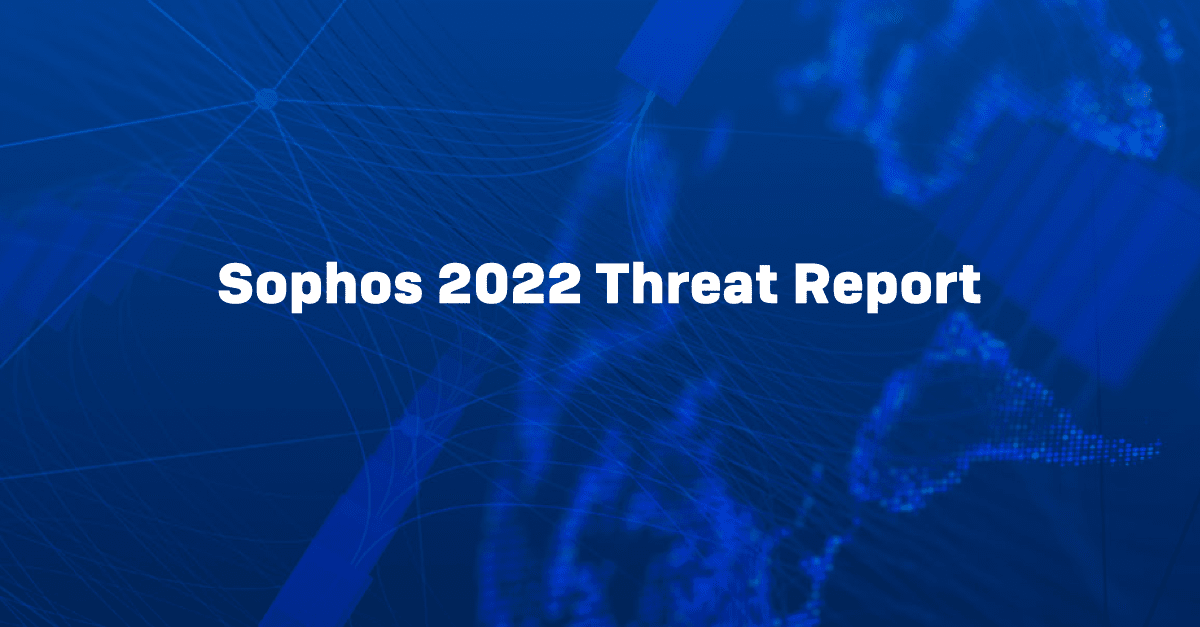GRTech
71% of Nigerian Organizations Hit by Ransomware – Sophos’ Annual “State of Ransomware 2022”
Sophos report shows 44% of Nigerian Organizations that had Data Encrypted in a Ransomware Attack Paid the Ransom


Sophos, a global leader in next-generation cybersecurity, has released its annual international survey and review of real-world ransomware experiences in the State of Ransomware 2022.
The report shows that 71% of Nigerian organizations surveyed were hit with ransomware in 2021, up from 22% in 2020. Forty-four percent of the organizations that had data encrypted paid the ransom to get their data back, even if they had other means of data recovery, such as backups.
The report summarizes the impact of ransomware on 5,600 mid-sized organizations in 31 countries across Europe, the Americas, Asia-Pacific and Central Asia, the Middle East, and Africa.


“The survey shows that, globally, the proportion of victims paying the ransom continues to increase, even when they may have other options available,” said Chester Wisniewski, principal research scientist at Sophos. “There could be several reasons for this, including incomplete backups or the desire to prevent stolen data from appearing on a public leak site. In the aftermath of a ransomware attack there is often intense pressure to get back up and running as soon as possible”.
Continuing, Wisniewski said, “Restoring encrypted data using backups can be a difficult and time-consuming process, so it can be tempting to think that paying a ransom for a decryption key is a faster option. It’s also an option fraught with risk. Organizations don’t know what the attackers might have done, such as adding backdoors, copying passwords and more. If organizations don’t thoroughly clean up the recovered data, they’ll end up with all that potentially toxic material in their network and potentially exposed to a repeat attack.”
Key Findings
The main findings of the State of Ransomware 2022 global survey from the Nigerian respondents, which covers ransomware incidents experienced during 2021, as well as related cyber insurance issues, include:
- More victims are paying the ransom – In 2021, 44% of organizations that had data encrypted in a ransomware attack paid the ransom
- The impact of a ransomware attack can be immense –The average cost to recover from the most recent ransomware attack in 2021 was US$3.43 million. It took on average one month to recover from the damage and disruption. Ninety-seven percent of organizations said the attack had impacted their ability to operate, and 96% of the victims said they had lost business and/or revenue because of the attack
- Many organizations rely on cyber insurance to help them recover from a ransomware attack – 81% of mid-sized organizations had cyber insurance that covers them in the event of a ransomware attack – and, in 97% of incidents, the insurer paid some or all the costs incurred
- Ninety-one percent of those with cyber insurance said that their experience of getting it has changed over the last 12 months, with higher demands for cybersecurity measures, more complex or expensive policies and fewer organizations offering insurance protection
“The findings suggest we may have reached a peak in the evolutionary journey of ransomware, where attackers’ greed for ever higher ransom payments is colliding head on with a hardening of the cyber insurance market as insurers increasingly seek to reduce their ransomware risk and exposure,” said Wisniewski. “In recent years, it has become increasingly easy for cybercriminals to deploy ransomware, with almost everything available as-a-service. Second, many cyber insurance providers have covered a wide range of ransomware recovery costs, including the ransom, likely contributing to ever higher ransom demands. However, the results indicate that cyber insurance is getting tougher and in the future ransomware victims may become less willing or less able to pay sky high ransoms. Sadly, this is unlikely to reduce the overall risk of a ransomware attack. Ransomware attacks are not as resource intensive as some other, more hand-crafted cyberattacks, so any return is a return worth grabbing and cybercriminals will continue to go after the low hanging fruit.”
Sophos recommends the following best practices to help defend against ransomware and related cyberattacks
- Install and maintain high-quality defenses across all points in the organization’s environment. Review security controls regularly and make sure they continue to meet the organization’s needs
- Proactively hunt for threats to identify and stop adversaries before they can execute their attack – if the team lacks the time or skills to do this in house, outsource to a Managed Detection and Response (MDR) specialist
- Harden the IT environment by searching for and closing key security gaps: unpatched devices, unprotected machines, open RDP ports, etc. Extended Detection and Response (XDR) solutions are ideal for this purpose
- Prepare for the worst. Know what to do if a cyber incident occurs and keep the plan updated
- Make backups, and practice restoring from them so that the organization can get back up and running as soon as possible, with minimum disruption
Read The State of Ransomware 2022 report for the full global findings and data by sector.
GRTech
Nnaemeka Ani Admonishes African Techies to Build for Legacy
“Let’s stop building for hype. Let’s start building for legacy.”


In a rousing declaration that is electrifying minds across the continent, Hon. Nnaemeka Ani, Special Adviser on ICT to Enugu State Governor Peter Mbah, has called for a homegrown digital revolution under the banner “Africa Will Rise: By Code, By Courage, By Us.”
The message, part challenge, part philosophical—seeks to galvanize African innovators to move beyond buzzwords and build technology with impact and legacy in mind.
“Let’s stop building for hype. Let’s start building for legacy,” Ani urged while speaking to ICT journalists over the weekend. “Let’s stop waiting for someone else. Let’s start creating the future—on our own terms.”
At the heart of Ani’s vision is a shift from tech consumerism to tech authorship. With innovation hubs sprouting across cities like Enugu, Lagos, Kigali, Jo’Burg, and Nairobi, and a growing community of developers, engineers, and entrepreneurs determined to solve Africa’s unique challenges, the movement is already taking shape.
Ani emphasized that Africa’s future lies not in flashy apps or international admiration but in persistent, intentional solutions that uplift communities—solutions that digitize public services, bridge rural-urban divides, empower women and youth, and build resilience in food and climate systems.
“We have the talent,” he said. “Now it’s time to harness it—to stop building for likes, and start building for lasting impact.”
With support from leaders like Ani and rising momentum in Africa’s tech corridors, it seems that a new chapter is being written—one line of code at a time.
Reviews
Book Review of The Village Priest by Remmy Nweke @NDSF 2025
By ‘Gbenga Sesan, Executive Director, Paradigm Initiative


On Thursday, June 19, 2025, I had the honour of reviewing The Village Priest by Remmy Nweke—a powerful narrative that weaves together history, tradition, resistance, reconciliation, and innovation, set within the verdant hills of Ilimefo, a village nestled in the heart of Igboland, where “the air was alive with the whispers of ancestors and the rhythms of tradition.”
At the heart of this story is Ogboo AniEze, the revered traditional chief priest of Ilimefo. His life is “dedicated to the preservation and celebration of Ilimefo’s customs and traditions.” The book opens with a clear and symbolic statement of context: “The village and its people, their traditional practices and strong cultural heritage at the crossroads!” This sets the tone for what is not just a fictional tale but a textured documentation of a people’s encounter with time and change.
Ilimefo is introduced to us as a place where “tradition was woven into the very fabric of life,” with festivals like Onwu-ano linked to agricultural cycles and the rhythms of the earth. The rituals, we learn, are not arbitrary. They are “intricately woven” into the identity and continuity of the people. Ogboo AniEze does not merely perform these rituals—he embodies them. “His eyes, clouded with the wisdom of age, seemed to hold the secrets of the past,” and his voice “could calm the most troubled of minds.”
We are told, in great detail, about the structure and discipline of his priesthood: lieutenants from six villages, each with precise roles. Some “raise a cup of water,” others “kill the offerings,” while others “prepare the offerings when cooked.” The sacred rhythm of Ilimefo is grounded in Igbo cosmology, with rituals observed “every Eke market day,” that is, every five days.
As a young boy, Ogboo AniEze apprenticed under his grandfather, “a renowned traditional priest.” His education was both spiritual and practical—“the sacred languages,” “traditional healing practices,” and also “farming, hunting, and craftsmanship.” Through sacred journeys to forests, rivers, and mountains, “a deep connection to the natural world and the spirits that inhabited it” was forged.
One of the cultural pillars explored in the book is masquerading—a practice that carries symbolic, spiritual, and social weight. The masks “represent ancestral spirits, mythological creatures, and symbolic figures.” During festivals, “masked performers danced and sang,” their performances serving both as entertainment and as “social commentary, addressing issues and concerns.”
Yet, as the wind of change began to blow, Ogboo AniEze “encountered modernizing influences such as Christianity and western education,” which “challenged his traditionalist views.” Criticism followed—some said his values were “outdated and restrictive,” accusing him of “lack of adaptability,” and being “disconnected from the modern reality.” But for Ogboo, his visions, his ancestral worship, and his connection to “sacred journeys” remained a steadfast compass.
The villagers, meanwhile, expected him to do more than perform rituals. They expected him to provide “spiritual guidance, interpreting the will of the gods and ancestors,” “offering counseling and mediation,” and even guidance on agriculture and healing. He became “a respected and beloved figure,” not because he resisted change, but because he “found creative ways to balance the two.”
But change came fast and hard with the arrival of GSM—“a strange and mysterious piece of technology.” Introduced by “a group of outsiders, including a Catholic priest, Fada Ekie,” mobile phones arrived in Ilimefo, bringing with them “a stir among the villagers.” At first, the villagers were “fascinated and intimidated,” unsure how to engage with “small and sleek” devices that brought “the hum of signals and the chatter of voices.”
This is where the book truly grapples with its core tension. For Ogboo AniEze, GSM was both opportunity and threat. It “distracted them from their traditional practices” and “threatened to erode the cultural heritage of Ilimefo.” And when his own son, Okorie, embraced the technology, seeing “economic prospects” and “new possibilities,” the crisis became deeply personal.
Ogboo AniEze was “torn between his love and pride for his son and his concern for the impact of the technology.” He feared GSM would “lead to the erosion of the village’s cultural heritage” and cause a “brain drain” as young people “leave the village in search of better opportunities.” He also feared “isolation from the community” and began to “question his own faith and the traditions he had sworn to uphold.”
This led to the turning point. In the hills, he embarked on “dry fasting for a whole four market days.” He returned from that solitary experience with “a new found understanding.” He saw that GSM, though disruptive, “also offered opportunities for growth, development, and connection with the wider world.” He reconciled with Okorie. He apologized to the villagers. He even welcomed the presence of Fada Ekie, the Catholic priest.
What follows is a new era of harmony, where “tradition and modernity coexisted in balance.” Ogboo AniEze began to use mobile phones to “coordinate traditional ceremonies and rituals,” to “document the village’s traditions,” and to “connect with villagers in the diaspora.” The GSM technology, initially feared, became “a powerful tool for preserving the village’s cultural heritage.”
Through collaboration with Fada Ekie, Ilimefo experiences what the book calls a “fusion of traditions”—traditional prayers “incorporated into Catholic ceremonies,” Catholic teachings “infused with indigenous spiritual practices,” and “ancestor veneration blended with the tradition of honoring saints.” The result is “a new spiritual identity,” where “community healing practices” are made stronger through cooperation, and where “interfaith collaboration” becomes a working model for other communities.
Even as GSM introduced new social behaviours—such as Facebook Live streaming of village festivals, or parishioners charging phones during Mass—there is no ridicule or mockery. Instead, Remmy Nweke allows the reader to witness cultural evolution with empathy and respect.
In the Epilogue, we find Ogboo AniEze and Fada Ekie standing together, “looking out at the vibrant scene.” Their story is one of convergence, of two paths that once seemed to diverge, now blending into one shared future. As “the village erupted in joyous cheers,” they “clasped hands,” symbolizing a unity forged through respect, dialogue, and vision.
Let me end where the book ends—on a note of blessing and pride. At the close of the novel, as the village celebrates this new era, Ogboo AniEze declares it “Oyibo Day” and rolls out the drums—not to erase his past, but to embrace a future that includes both Okorie’s device and his own divination, both digital and divine.
The Village Priest is a careful work of cultural documentation, offering not just a story but a chronicle—a record of transition that many rural and even urban African communities continue to live through. It teaches us, without preaching, that true innovation is not in abandoning our roots, but in strengthening them with new tools.
Thank you.
GRTech
Refurbished tech: Making a smart choice for a greener future
By Qrent Managing Executive Kwirirai Rukowo


Consumers and businesses are constantly striving for the latest and greatest technology. However, behind the pursuit of cutting-edge devices lies a significant environmental toll – one that often goes unnoticed. The production of new technology requires vast amounts of natural resources, energy, and labour, contributing to both environmental degradation and significant carbon emissions.
With concerns about sustainability at an all-time high, companies are now looking for ways to reduce their environmental impact without compromising on performance or innovation. Refurbished tech, such as the solutions offered by Qrent, presents an effective, affordable, and eco-friendly alternative.
The refurbished computers and laptops market is set for remarkable expansion, driven by both cost-effectiveness and a growing commitment to sustainability. According to Credence Research, the market is projected to surge from USD 17,856.6 million in 2024 to USD 39,405 million by 2032, achieving a compound annual growth rate (CAGR) of 10.4% during the forecast period.
This growth underlines the increasing adoption of refurbished IT equipment by businesses, educational institutions, and individual consumers as they seek to balance performance with environmental responsibility. The rising trend not only helps organisations reduce capital expenditures but also supports circular economy initiatives by extending the lifecycle of electronic products
As businesses face increasing pressure to meet environmental, social, and governance (ESG) goals, refurbished tech is fast becoming a preferred choice for companies looking to cut costs while reducing their carbon footprints.
At Qrent, businesses can access high-quality, refurbished IT equipment that meets the demands of modern enterprises while simultaneously supporting sustainability initiatives. The company provides a range of refurbished devices including computers, laptops, and servers, ensuring that businesses can operate efficiently while minimising their environmental impact.
These devices are thoroughly tested and restored to like-new condition, offering the same reliability and performance as their brand-new counterparts but with a fraction of the carbon footprint.
Refurbished tech and the circular economy
The transition to a circular economy – a system that emphasises reusing, recycling, and remanufacturing – has become a critical strategy in tackling the world’s waste crisis. The electronics industry is one of the largest contributors to this crisis, with e-waste being the fastest-growing waste stream globally.
By choosing refurbished technology from Qrent, businesses contribute directly to the circular economy. When companies choose to refurbish and extend the lifecycle of their IT devices, they prevent valuable resources from ending up in landfills and reduce the demand for new products, thereby conserving raw materials and decreasing pollution.
Qrent’s refurbishment process includes the responsible recycling of old components and ensures that all equipment is brought back to life in an eco-friendly manner. This not only helps in reducing waste but also plays a significant role in limiting the environmental impact of tech manufacturing.
Embracing circular economy strategies not only prolongs the lifespan of IT assets but also significantly cuts down the need for new manufacturing – thereby reducing carbon emissions. The 2024 Forrester Report on The Circular Economy & Sustainable Manufacturing reveals that a substantial share of firms are already reaping sustainability benefits: 38% have adopted innovative delivery and fulfilment options that minimise waste, 32% are improving waste management practices, and 28% are focusing on more efficient material sourcing.
By opting for refurbished technology, companies can leverage these practices to lower reliance on virgin materials and the high emissions associated with producing new devices, marking a crucial step toward a greener, more sustainable IT procurement model.
Attaining your sustainability goals
Qrent provides businesses with sustainable IT solutions. The company not only supplies refurbished technology but also offers a comprehensive range of services that include equipment leasing, IT asset management, and secure data destruction. Businesses can now gain access to a scalable solution that meets their IT needs while simultaneously supporting their ESG initiatives.
The company’s commitment to reducing e-waste is evident in its emphasis on responsible recycling and disposal practices. When companies dispose their old IT equipment with Qrent through their IT Asset Disposal Solution, they can be confident that their devices will be decommissioned properly and reused, ensuring that valuable materials like metals, plastics, and glass are recovered and re-entered into the manufacturing cycle.
This process prevents toxic substances from polluting the environment and ensures that e-waste is managed in a safe, responsible manner.















